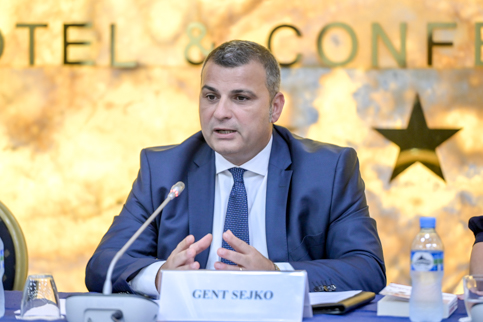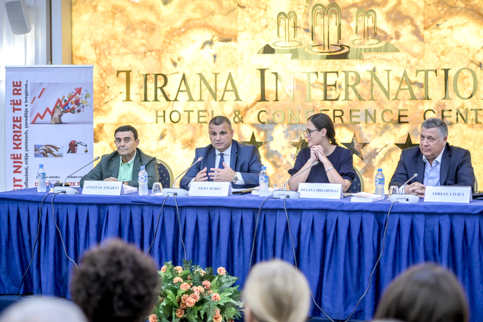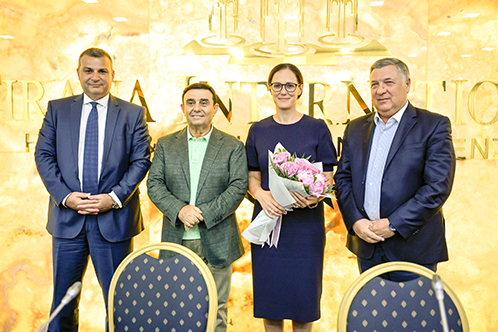BANK OF ALBANIA
PRESS RELEASE
Governor Sejko: Address at the promotion of the book on “Towards a new crisis”, by A. Angjeli, A. Civici
Publication date: 05.07.2022
I appraise this book as an early publication, at global level, in response to this “third crisis” as the co-authors call it.

The book addresses a long list of issues and challenges that both the global and Albanian economies are facing. The authors, through their narrating, bring to the reader the reality of the situation we are experiencing, tracing the chronology of successive crises from the earthquake of 26 November 2019, to the pandemic, the "post-covid" period, and finally, the crisis fuelled by the war in Ukraine. The combined discussion of these developments and their effects on production and global economic and financial activity outline the main axis of the book. In this way, they manage to present a comprehensive and real analysis of geopolitical events coupled with the geo-economics developments. This full landscape is pictured through the intersection of data and event analysis with history and future challenges. Above all, a complete and comparative view of the economic, financial and monetary policies needed to tackle these challenges complement the analysis and conclusions provided in this book.

The war crisis, the food security crisis (where prices were rising progressively, even before the Russian attack on Ukraine), the energy and raw materials crisis, the overall slowdown in economic growth, inflation, and most recently, the prospect of higher interest rates, are impacting on an already severely damaged landscape by two years of pandemic.
This book is dedicated to tracing this situation day by day and week by week, trying to answer the questions: "What will happen? Where are we going? What will change?"
The authors expose and explore in a professional manner the ambiguities, lack of clarity about the duration and consequences of the war, uncertainty, different approaches, questions, paradoxes and dilemmas, characterising this period.

In contrasting the situation in Albania to the global one, the authors find out that no economy at the European level and beyond, was spared and cannot be spared from this war and the geopolitical challenges that define it.
To assess the possible negative effects on prices and economic activity, the projection of the analyses is placed on the Albanian economy. The current challenge that the Albanian economy faces, resulting from the sharp upsurge in the prices of energy, food and commodities in international markets, has driven the living costs for households more expensive and has increased the production costs for businesses. Also, the ambiguity over the duration and consequences of the war in Ukraine has intensified the uncertainty in financial markets and created new supply-chain bottlenecks. Hence, this shock, which has begun to be transmitted in the Albanian economy, requires a swift, effective and comprehensive reaction of the public authorities, in a situation with many unknowns and with deep economic, political and social changes.

Delving into the pages of the book, I note with pleasure that the suggestions provided for the economic and financial policies in the case of Albania are in line with the current orientation of the Albanian authorities. I take this opportunity to thank the authors for appraising the monetary policy and state that: “The prudential monetary policy of the Bank of Albania in implementing a prudent policy of interest rate increase, in addition to safeguarding the stability of foreign currencies exchange rate, is a valuable support in this regard. It restricts the impact of stagflation (of the euro area) on the Albanian economy.”
The Bank of Albania, as the authors affirm, is monitoring the situation on ongoing basis. In these circumstances, the focus of economic policies should be oriented towards preserving price stability, as a precondition for: the financial stability of Albania; the sustainable and long-standing growth; and helping the poorer segments of the society. In view of a rapidly uprising inflation in Albania and globally, the Bank of Albania, in its response, took a first step towards monetary policy normalization, increasing by 0.5 percentage point the policy rate.
At the same time, we have signalled our willingness and readiness to take any necessary monetary measures to avoid the transmission of this expected shock into high inflation in the future. Our transparent communication for the monetary policy has clarified the public on forward guidance and has helped to control inflation expectations in financial markets.
In response to these measures, which are appropriate and taken in a timely manner, and the continuation of monitoring and the adequacy of the stance of monetary policy, our analyses assess that the Albanian economy has sufficient premises to withstand the shock and avoid recession.
However, we continue to face unprecedented circumstances, where it is difficult to determine a time when this situation will come to an end. As the President of the ECB, Christine Lagarde, says: "Clearly, the longer the war lasts, the higher the economic costs will be and the greater the likelihood we end up in more adverse scenarios”.
Uncertainty is also reflected in our forecasts. Regardless, this does not mean that we do nothing. On the contrary, the Bank of Albania is doing its best by continuously monitoring (as the authors have done during the journey of this book, day after day, week after week), the implications of the crisis in the economy, the performance of the financial markets, as well as the effectiveness of the measures taken. The Bank of Albania stands ready to use all available instruments to mitigate the effects of this crisis on both price stability and on the financial stability and economic activity.
As the authors point out, the challenges that lay ahead are very serious and should receive the proper attention. Here, I am talking about the new challenges - in addition to the current ones - that are outlined on the horizon, as digitalization and financial innovation. In this view, the authors have addressed both factors in an entire section of the book. Global warming, the ageing of the population, or the change in the business model, resulting from geopolitical tensions, are other challenges to deal with. In this regard, the Bank of Albania has included the above issues in the focus of medium-term and long-term institutional policies by conducting studies to understand these challenges and their implications in the economy and financial system.
A comprehensive approach, where all public actors, private sector operators, international organizations, non-government organizations and academics, collaborate by taking the right decisions, in a timely manner and in the most coordinated way, is needed to tackle these challenges.
Concluding, I am confident that, if each of us will do our best, we will be able to withstand this shock, and we will come out of this crisis stronger and better prepared for similar shocks in the future.
Thank you once again for the opportunity to express my thoughts on a book that represents a must-read for intellectuals, economists and students. This book opens a window of knowledge to see where we are going, that is, what will happen to the economy of Albania and globally in the coming years.
Thank You!

 Twitter
Twitter
 Youtube
Youtube
 Facebook
Facebook
 Flickr
Flickr
 RSS
RSS
 Subscribe
Subscribe
 Feedback
Feedback